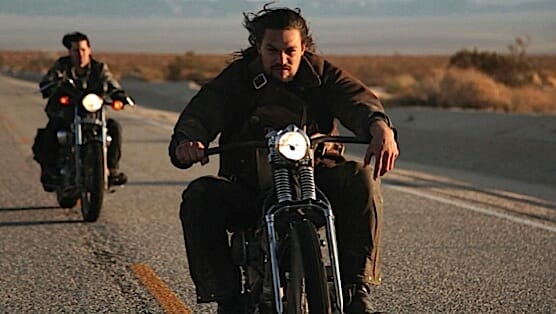
Actors who transition to behind the camera are usually either keen to not act in their first film as a director, take a small supporting role in order to help secure financing, or try something completely different (and something which they maybe haven’t been given the opportunity to do). Then there’s something like Road to Paloma, the directorial debut of multi-hyphenate Jason Momoa, which feels very much like the type of low-budget independent film, arguably minus just a bit of action, that could otherwise get made on the reputation of its star’s brooding physicality. So where’s the passion, or distinguishing characteristics—what’s the point?
The Stargate: Atlantis, Game of Thrones and Conan the Barbarian actor stars as Wolf, a Native American who lives on the lam in the American Southwest after avenging the rape and murder of his mother. After briefly checking in with his father Numay (Wes Studi), a law enforcement officer on the reservation, Wolf hits the road again, and makes friends with Cash Guirgis (Robert Homer Mollohan), a drifter, drinker and kindred spirit. Then, as a nominal investigative thread unfolds—in which yokel Schaeffer (Chris Browning) and an asshole FBI agent, Williams (Timothy Murphy), search for the fugitive—Wolf and Cash ride around on their motorcycles, scraping together money here and there, coming across various characters and winding their way toward salvation.
At once restless and listless, Road to Paloma doesn’t really know what sort of film it wants to be (road movie, revenge tale, crime drama, fraternal character study, snapshot of male crisis), and the problem is that it doesn’t particularly deliver well on any narrative front on which it chooses to engage. This renders the finished product less a failure of competing or conflicting visions and more just a buffet of poorly executed meanderings, riddled with various hallmarks of ill-reasoned, slapdash filmmaking. (Witness the fight scene where a gathered rowdy crowd falls into hushed silence in unison.)
When it’s not cycling through self-evident and unnecessary dialogue (“I’ve been on the run ever since,” explains Wolf to another character, underscoring what the audience has already witnessed), the movie consistently puts hackneyed words into its characters’ mouths. (“You look like shit” rates two usages, falling short of the expected hat trick.) And the investigation meant to inject some tension is a total wash, lacking believability or emotional currency.
What’s most bewildering about Road to Paloma, though, is the fact that it insists—like some misbegotten Cannon Films 1980s action flick—on offering up oddly correlative, one-to-one redemption for Wolf. Apropos of nothing, late in proceedings he and Cash happen upon a kid who stumbles out of the desert up toward a road and exclaims, “My mom—that man is raping her!” So this gives Wolf a chance to actually stop a rape in progress this time, and not merely dispense justice after the fact. It’s a clumsy idea, rendered much further problematic by the fact that the charged scene begins during dusk and then jumps into straight-up nighttime, with the assault lit by a truck’s headlamps.
Road to Paloma is notionally aiming for something more contemplative and figurative, by way of a technical package that, at times, touches evocativeness. Cinematographer Brian Andrew Mendoza captures some of the spare, desolate, natural beauty of Needles, Calif., where most of the film is shot. And Momoa, with the assistance of a score from Ohad Benchetrit and Justin Small and smart song selections from music supervisor Howard Paar, creates a couple pockets of music-video-type mood here and there. The story, however, is a complete non-starter.
There’s a certain market floor for dusty outlaw biker pictures, dating all the way from 1969’s Easy Rider to something like 2008’s little-seen but not entirely uninteresting Hell Ride, which was executive-produced by Quentin Tarantino. (Let us not speak at all of Torque.) Revved bikes don’t sustain the genre, however; offerings require interesting characters. Unfortunately, Momoa’s film lacks both vision and personality; all of the characterizations are so painfully paper-thin as to wreck a viewer’s sympathetic identification or rooting interest.
Momoa has a certain charisma and easy confidence that is appealing—he knows how to wield a smirk without coming across as a jerk, and the masculinity he projects isn’t puffed-up or preening. Unfortunately, in Road to Paloma, he’s basically co-written himself a role that is a cipher, but one motivated by such clichéd circumstances that it strips him and the film of any mystery. Even less would be more. As is, this Road isn’t worth traveling.
Director: Jason Momoa
Writers: Jason Momoa, Robert Homer Mollohan, Jonathan Hirschbein
Starring: Jason Momoa, Robert Homer Mollohan, Lisa Bonet, Michael Raymond-James, Chris Browning, Timothy Murphy, Steve Reevis, Sarah Shahi, Wes Studi
Release Date: July 18, 2014 (in theaters and VOD)
Brent Simon is a regular contributor to Screen Daily, Paste, Playboy and Magill’s Cinema Annual, among other outlets, as well as a member and former three-term president of the Los Angeles Film Critics Association. You can follow him onTwitter and on his blog.